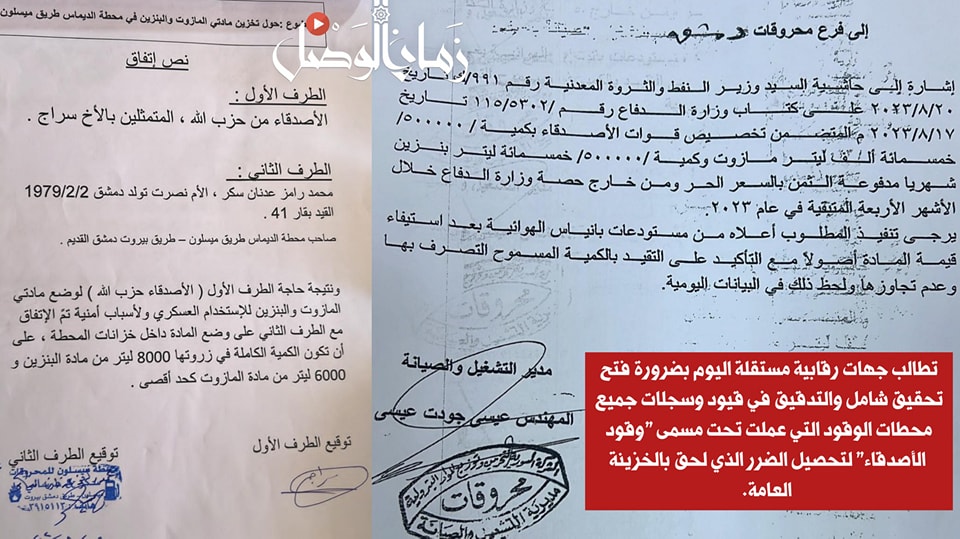At the height of the economic crisis that swept Syria before the fall of Assad, while citizens stood in long lines to obtain a few liters of fuel, the threads of an organized corruption network for smuggling and stealing petroleum products were exposed. Operating under the guise of "Friends' Diesel and Gasoline," the network left huge losses to the national economy and exacerbated the suffering of Syrians.
According to informed sources, the story began in 2019 in Aleppo, where it is alleged that the commander of the "Jerusalem Brigade," Muhammad al-Saeed, coordinated with the former governor of Aleppo, Hussein Diab, and the commercial director of the "Mahroukat" company at the time, Mustafa Hasweya, to launch a large-scale operation to smuggle petroleum products and sell them on the black market. According to the sources, official approvals were obtained to provide legal cover for these operations, allowing large quantities of smuggled fuel to be brought into Aleppo.
These petroleum products were sold at black market prices and distributed to specific gas stations under the banner of "Friends' Fuel." This designation, which had no official status, served as a shield to protect these stations from any legal accountability or oversight by the Supply Directorates and Customs. Thus, it became nearly impossible to know the regular quantities of smuggled fuel held by these stations, opening the door wide open to organized looting.
This practice was not limited to Aleppo; it quickly spread to other governorates, such as Hama, Homs, and the Damascus countryside. Major fuel traders became involved in this network, obtaining stolen petroleum products from the public sector and distributing them under the pretext of "friends' fuel" to evade oversight and taxes. These operations coincided with the influx of massive quantities of smuggled fuel across the Lebanese border, exacerbating the crisis.
An Ominous Meeting and Lucrative Vouchers
This network witnessed a dangerous development on September 5, 2020, when a meeting was held at the headquarters of the Military Intelligence Division, attended by Major General Kifah Melhem, head of the division; the commander of the Al-Quds Brigade, Muhammad Sa'id; and the commercial director of the "Mahrukat" company. According to information, this meeting resulted in a decision to issue special "vouchers" or "missions" to Sa'id, allowing him to spend unlimited quantities of fuel at any gas station in the country.
These vouchers quickly became a valuable commodity on the black market, where they were sold at exorbitant prices, generating huge profits for the network's members.

Protection Fees and a Dramatic Exchange Rate
To ensure the continued operation of this system, gas station owners wishing to join the "Friends" network were required to pay exorbitant fees, estimated at up to $50,000 per station. This sum guaranteed the station a "permit" enabling it to possess and sell smuggled petroleum products without fear of accountability.
These illegal operations injected a massive, unofficial cash flow into the market, which, according to economic analysts, led to a dramatic rise in the exchange rate of foreign currencies against the Syrian pound and further eroded citizens' purchasing power.
In a related development, 2020 witnessed the dismissal of a number of managers from the "Mahroukat" company who, according to sources, refused to comply with the orders of this powerful network and participated in the corruption scheme.
Independent oversight bodies are now demanding a comprehensive investigation and audit of the records and records of all gas stations operating under the name "Friends' Fuel" to recover the damage inflicted on the public treasury.
Adding to the complexity of the matter is talk of millions of liters of fuel that had entered the country as support from Iran and Hezbollah under the guise of "supporting military operations" before the liberation of many areas. With the end of military operations in those areas, it is believed that complicit gas station owners seized these quantities and sold them on the black market, amassing enormous fortunes at the expense of the support allocated for the war effort at the time.
The "Friends' Fuel" case remains stark evidence of the depth of corruption that has pervaded the Syrian state during the war years, and how the suffering and crises of citizens have become a source of obscene wealth for organized networks of warlords and influential merchants.
Zaman Al Wasl
















Comments About This Article
Please fill the fields below.